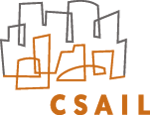Two CSAIL Students Named Google Anita Borg Scholars for 2008
CSAIL is happy to announce that two students, Raluca Ada Popa and Ghinwa Choueiter, have been awarded 2008 Google Anita Borg Scholarships for their academic achievements in the fields of computer science and technology. The $10,000 scholarship is awarded annually to 20 female undergraduate and graduate students pursuing degrees in computer science and technology in the United States. The awards provide support and encouragement to recipients to continue their educations. Applicants were selected on the strength of their academic backgrounds and their demonstrated leadership roles. Popa and Choueiter’s enthusiasm for their respective work is evidenced by their tireless work ethic and desire to make a difference in the world. Both women exemplify the same determination and spirit as the woman for whom the award is named. Dr. Anita Borg (1949-2003) devoted her life to changing the way society thinks about technology and eliminating barriers that keep women and minorities out of computer science and technology. She founded the non-profit Institute for Women and Technology, which now bears her name, as well as a pioneering conference and online community for women in technology.
Meet Raluca Ada Popa

Popa is an undergraduate in the class of 2009 in computer science and mathematics. She is currently working on two CSAIL research projects; electronic voting, specifically probabilistic auditing of elections, with Professor Ronald L. Rivest and distributed systems, specifically reliable data caching and communication, with Professor Barbara Liskov. Popa hopes her group’s work in electronic voting will lead to much safer elections because it would allow officials to certify that an election result is correct with high probability. She hopes that someday it will be mandated by legislation in the United States. She hopes that her work in distributed systems will lead to safer Internet transactions such as banking. Even with her full coursework load, Popa has taken on leadership roles in both projects. She has given talks at conferences and spoken to election officials about their electronic voting techniques. She has also taken a lead role in the design of her caching project. But it’s an opportunity she relishes. “I love explaining my work to other people and showing them how to apply it to their lives. It makes me feel that my work has a real impact and hopefully changes the world,” she said.
Meet Ghinwa Choueiter:

Choueiter is a graduate student at CSAIL in the Spoken Language Systems Group, and expects to receive her Ph.D. in September. She works with Principal Research Scientists Jim Glass and Stephanie Seneff on sub-word modeling, which is a program that allows computers to learn to spell and pronounce new words they encounter. During her time at MIT she has taken on several leadership roles. In the summer of 2006 Choueiter was a core organizer for TECHLEB|06, which was the first conference held on technological development in Lebanon. She was also an officer in her dorm her first year at MIT. Choueiter admits that she delayed applying for the scholarship because there always seemed to be something else that came up. But the deciding moment was when a male friend asked if he could apply. “At that moment I realized I was missing out on a great opportunity that is specifically tailored for women like me and I made up my mind to get it done this year,” she said. She tackled the scholarship application in much the same way she has taken on other projects in her career. “I saw it as a new challenge and I went for it. It’s another achievement I can be proud of,” she says. The two will attend a networking retreat for scholarship winners at Google’s Mountain View, California headquarters in early April—and then they plan to get back to work as quickly as possible. Both said they take more pride in the recognition of their work than in the money that will help them finance their education. They also both hope the scholarship will help them use their research to have an even greater impact in the future.


